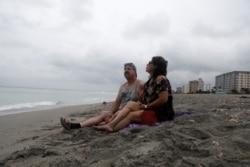The western coast of the U.S. state of Florida is bracing for the arrival Wednesday of Hurricane Elsa after it dumped heavy rain on Cuba and pounded the Florida Keys.
Elsa, which registered Friday as the season’s first hurricane, had weakened to a tropical storm by Saturday. Late Tuesday, the U.S. National Hurricane Center said it had strengthened again to hurricane status with sustained winds of 120 kph (75 mph).
Worsening weather conditions in southern Florida fueled by Elsa are hindering the search for survivors of the partial collapse of a residential building that workers fully demolished Sunday.
The National Hurricane Center said Tuesday that Elsa is expected to “move near or over portions of the west coast of Florida later today through tonight” before making landfall Wednesday morning “along the north Florida Gulf coast.”
Forecasters said that once Elsa makes landfall in Florida, it is expected to weaken as it moves inland and travel across the southeastern U.S. through Thursday.
Rainfall was expected Tuesday in the Florida Atlantic coast town of Surfside, where the residential building collapsed June 24, killing at least 32 people. More than 100 others are still missing.
The NHC also warned that Elsa could bring life-threatening storm surges, flooding and isolated tornadoes.
“The combination of a storm surge and the tide will cause normally dry areas near the coast to be flooded by rising waters moving inland from the shoreline,” the NHC said.
This report includes information from Associated Press and Reuters






